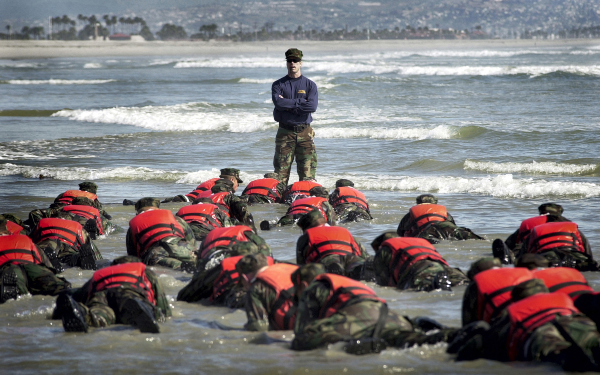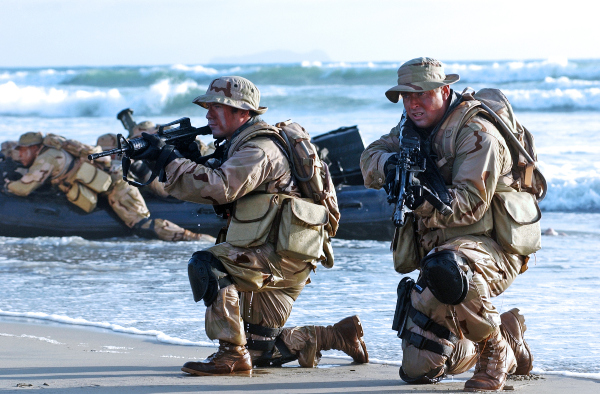The U.S. Marines and Navy SEALs are considered two of the most elite military fighting forces in the world.
While becoming a member of either is impressive in its own right, there are some notable differences between the two organizations.
The purpose of the article is not to debate which group is “tougher” or “better.”
It’s pointless to debate an issue that is up to so much speculation.
However, it’s worth comparing Navy SEALs vs. Marines for people interested in joining the military as part of an elite force.
Continue reading to learn more about the U.S. Marines and Navy SEALs to decide which one is the right fit for you.
Related Article – Pros and Cons Of Joining The Navy
Jump To A Section
Fast Facts

Before we get too deep into the similarities and differences of Navy SEALs vs. Marines, take a look at a comparison of each below:
| Navy SEALs | Marines | |
|---|---|---|
| Established: | 1962 | 1775 |
| Size: | 2,500 | 182,000+ (Active) 38,500 (Reserve) |
| Motto: | "It Pays to be a Winner" "The Only Easy Day Was Yesterday" | Semper Fidelis |
| Headquarters: | Naval Amphibious Base Coronado, Naval Amphibious Base Little Creek | The Pentagon Arlington County, Virginia, U.S. |
| Nicknames: | - "Frogmen" - "The Teams" - "The Men with Green Faces" | - "Jarheads" - "Devil Dogs" - "Leathernecks" |
| Military Role: | - Special operations - Direct action - Counter-terrorism - Special reconnaissance - Unconventional Warfare | Amphibious and expeditionary warfare |
Below we will explain four major differences between U.S. Marines and Navy SEALs.
It’s a good idea to learn the difference between Navy SEALs and Marines because it should help you make the right decision for enlistment.
Though Marines are incredibly respected and still considered the most elite US military branch, there is no secret that SEALs undergo much more rigorous training.
Difference #1 – Requirements

Every branch of the U.S. Armed Forces has requirements before enlistment.
There are basic, general requirements that are universal for every Soldier, Sailor, Airmen, or Marine (regardless of branch or unit), and other qualifications specific to the military branch.
Special operations forces notoriously have harder requirements to meet for qualification.
It is what makes special-ops forces elite and highly valued by the military in the first place since entrance requirements are stiff.
Navy SEALs Requirements
Prospective Navy SEALs must meet basic requirements including:
- Citizens of the United States
- High school diploma (or GED equivalent)
- Meet specific eyesight requirements: 20/40 best eye; 20/70 worst eye; correctable to 20/25 with no color blindness
- No history of alcohol or drug abuse
- Pass the Navy SEAL Physical Screening Test (PST)
- Be eligible for a security clearance
- Pass a physical exam required for Navy Divers
- Be between the ages of 17-28
- Meet the ASVAB scoring requirements of GS+MC+EI=170; or VE+MK+MC+CS=220; or VE+AR=110 with an MC=50
Prospective SEALs also need to demonstrate “good moral character,” which is traditionally examined through your criminal record (or lack thereof) and other factors.
It’s worth mentioning that it is a misconception that the Navy SEALs are only open to men.
The U.S. Armed Forces recently approved the right for female Sailors to join elite forces, like the SEALs.
The Navy celebrated the first woman to pass the Navy SEALs rigorous training course in 2021, and she went on to become a Special Warfare Combatant-craft Crewman (SWCC).
However, as of July 2023, the Navy SEALs have yet to welcome its first female operator.
U.S. Marines Requirements
Prospective Marines must meet basic requirements including:
- Citizens of the United States
- High school diploma (or GED equivalent)
- Between the ages of 17-28
- No history of alcohol or drug abuse
- Pass a Military Entrance Processing Station Medical Exam
- Pass the Armed Services Vocational Aptitude Battery (ASVAB) with a minimum score of 31. Marine Corps Military Occupational Specialties (MOS) have much higher ASVAB score requirements.
Unlike the SEALs, the Marines allowed women to join the organization as far back as 1918. After 1948, women became a regular part of the Corps.
The SEALs didn’t allow women to apply until 2016.
The Marines have two primary special operations forces: Marine Raiders and Force RECON.
Force RECON units are usually assigned by the military to gather information in dangerous parts of the world, while Raiders are small lethal teams designed to eliminate dangerous high-priority targets.
Regardless, every Marine is considered a more elite soldier compared to regular service members of the Army and Navy.
Related Article: 12 Famous Female US Marines
Difference #2 – Training

There is no mistake that both types of training are incredibly demanding and thorough.
However, the overall consensus is that Navy SEAL training is more challenging and demanding because the special-ops force is more selective with fewer members compared to the Marines.
Navy SEALs Training
It is difficult to argue that Navy SEAL training is the most intense and daunting of any special-ops force.
In fact, the dropout rate for Navy SEAL training is around 80 percent, meaning only 2 out of every 10 recruits make it past the training.
The average Navy SEAL spends more than a year going through a series of formal training before being recognized as an official special-ops member.
The two most infamous portions of the training are:
- Basic Underwater Demolition/SEAL (BUD/S) School (24 weeks)
- SEAL Qualification Training (SQT) Program (28 weeks)
Aspiring SEALs must also attend and complete Parachute Jump School.
Training has the direct purpose of “weed out of the weak” and will challenge in you every conceivable way.
The first couple of months are primarily demanding physical training.
Then, you progress to a second phase consisting of more physical conditioning, combat diving, and land warfare training.
New recruits are nearly always in motion from running to rolling in the sand, wading through mud, and swimming in water.
The final four months of training consist of pre-deployment and intensive specialized training.
If you are driven and fortunate enough to make it past basic training you should feel good about being one of every 200-250 recruits out of 1,000 candidates to successfully complete Navy SEAL training each year.
Related Article – Navy SEAL Weapons And Gear
U.S. Marines Training
Despite the Marine Corps being considered less demanding in training compared to SEALs, it is actually not true about boot camp.
In fact, Marine Corps Basic Combat Training, or boot camp, is arguably considered the most intense of any military branch.
Marine Corps boot camp (13 weeks) is far longer than the Army and Navy (10 weeks).
The Marines train over 30,000 new recruits each year in a challenging environment that tests physical and mental character.
The Marine Corps has a far higher success rate for completing training compared to the SEALs, as 90% of recruits pass boot camp.
During the first nine weeks, the emphasis is on phase one and two training.
The two phases introduce soldiers to weapon handling, combat skills, and marksmanship.
Recruits are also taken through gas chamber training and participate in field firing range competitions.
The final three weeks of BCT include a defensive driving course and several other tests you must pass.
After completing boot camp, Marines receive additional advanced training for their MOS, or Military Occupational Specialty.
Related Article – Delta Force Vs. Navy SEALs
Difference #3 – Mission

Both Navy SEALs and Marines have extremely important responsibilities in the U.S. Armed Forces.
Debating which special-ops group has more responsibility or importance is pointless because each branch is specially reserved for certain types of missions.
Navy SEALs Missions
Navy SEALs have several delegated responsibilities including:
- Special Operations
- Direct Action
- Counter-Terrorism
- Special Reconnaissance
- Unconventional Warfare
- Hostage Rescue
- Foreign Internal Defense
- Counter-Proliferation
- Counter Narcotic Operations
Navy SEAL teams were originally sent out during the Vietnam War.
Interestingly enough, SEAL teams continue to get organized in the same structure as those in Vietnam.
The current two Navy SEAL teams are Naval Special Warfare Group One (West Coast) and Naval Special Warfare Group Two (East Coast).
Both teams are under the command of Naval Special Warfare Command in California.
There are at least eight confirmed Navy SEAL teams and while most of their operations are highly secretive and confidential, we do know a few things.
Navy SEAL teams are deployed around the world as part of Special Operations Task Forces or Naval Special Warfare Squadrons.
Each SEAL team has an assigned Navy commander, eight operational platoons, and a headquarters element.
The operational teams are usually two to four special operators per task unit.
SEAL members are worthy of the title “super soldiers” as they can do just about everything.
It includes “Leap Frogs,” or specially assigned Navy Parachute Teams that provide demonstrations for recruiting purposes.
Perhaps the most famous Navy SEALs operation of all time was the apprehension and death of Osama bin Laden in 2011.
Related Article – 18 Most Famous Navy SEALs (and 3 controversial ones)
U.S. Marines Missions
The role of Marines is outlined as “amphibious and expeditionary warfare.”
What that means is Marines have three primary areas of responsibility or focus:
- Defense or seizure of advanced naval bases and other land operations that support naval campaigns.
- Development of tactics, techniques, and equipment used by amphibious landing forces that support the Army and Air Force.
- Other duties that are assigned by the U.S. President or Department of Defense.
Therefore, Marines are capable of “asymmetric warfare” or unconventional warfare that follows different tactics and strategies compared to usual forces.
Though the capabilities of Marines are not unique in any particular way, they are generally considered more advanced compared to soldiers of the Army and Navy.
The Marine Corps may and often does deploy combined-arms task forces to any part of the world in a matter of days.
The Marine Corps takes great pride in its mindset that “Every Marine is a rifleman” meaning that the branch focuses first and foremost on supporting its infantry.
Consequently, every Marine (regardless of MOS) receives training as a rifleman.
All officers receive additional training as infantry platoon commanders.
The additional training is designed by the Marine Corps to make every soldier versatile and capable of handling a wide range of responsibilities not commonly associated with service members of the Navy or Army.
Marines have evolved over the decades to go primarily from a ground force during WWII to also supporting numerous aerial and sea attacks.
The legacy of Marines includes being the first to develop helicopter insertion into warfare, as well as the first American force to widely adopt “maneuver-warfare” principles.
As a result, Marines always strive to have low-impact missions that minimize combat and casualties through tactical maneuvers.
U.S. Marines have been involved in practically every major conflict since the 18th century and made historical gains during WWII.
Difference #4 – History

It is obvious that the U.S. Marine Corps has a far longer history considering the special ops force was conceived in the late-18th century compared to Navy SEALs which only date back to the 1960s.
Regardless, both special operations forces have intriguing histories worth mentioning.
Learning and appreciating the history of these two prestigious forces is an important part of becoming a member of either branch.
Navy SEALs History
The Navy SEALs have a much shorter history in the world of warfare.
The organization wasn’t created until 1962, though its origins date back to the 1940s when volunteers served an elite force known as “Seabees”.
Seabees were orchestrated to clear obstacles on beaches before troops arrived.
Later, Seabees evolved into Combat Swimmer Reconnaissance Units.
Combat Swimmer Reconnaissance Units were important on both fronts of World War II yet didn’t receive quite as much notoriety as Marines during WWII.
It wasn’t until 1962 when President John F. Kennedy declared the Navy SEALs that the elite force became official.
Navy SEALs arguably had their “golden era” during the war in Vietnam.
President Kennedy had acknowledged that American troops needed a specialized force to fight an unconventional war in the Pacific.
Navy SEALs were the answer to guerrilla warfare being utilized by the Viet Cong.
Today, SEAL members are highly regarded for their ability to fight from sea, air, or land.
They have been involved in every major U.S. conflict since Korea, including the successful DEVGRU assassination of 9-11 mastermind Osama bin Laden.
Related Article – US Navy SEAL Rank Structure
U.S. Marines History
The Marine Corps has a much older and more detailed history compared to Navy SEALs.
Marines were originally established in 1775 to assist in the Revolutionary War.
Therefore, its origins date back practically as long as the official creation of the nation.
The initial purpose of the Marine Corps was to handle maritime operations and protect national interests overseas.
After being disbanded shortly after the conclusion of the Revolutionary War, the Marine Corps was re-established in 1798.
The legendary military branch has served in every major conflict since the War of 1812.
If the “golden era” of Navy SEALs was during Vietnam, then one could argue World War II was the pinnacle for Marines.
Marines were instrumental in an Allied victory during WWII including heroic efforts at Iwo Jima and Guadalcanal, to name a couple of examples.
Marines were also prevalent during the invasions of Afghanistan and Iraq following the events of September 11th.
Frequently Asked Questions (FAQ)

Here are some commonly asked questions regarding Navy SEALs vs. Marines…
Related Article: 13 Pros And Cons Of Joining The Marines
Can a Marine become a Navy SEAL?
While both special operations forces have ties to the U.S. Navy, the answer is no.
There is no such thing as joining the Marines Corps and then transferring over to the Navy BUD/S program to become a Navy SEAL.
The only way that would be possible is if you conclude your service agreement with the Marine Corps and then enlist in the Navy as a new recruit.
Because of this reason, it is important to determine which special-ops group you are more interested in before enlisting in the Marine Corps or Navy.
Serving both elite forces is a special privilege and honor, but as you can see they have their differences.
Which is more elite?
Now, this is a very difficult question to answer yet is one that is frequently asked by candidates interested in joining an elite force.
There are arguments on both sides to point out which one is better in the Navy SEALs vs. Marines debate.
The bottom line is there is no clear-cut answer as both special operations focus on slightly different missions.
It is difficult to find a more lengthy, demanding, and intense form of training than what SEALs have to endure before officially joining the force.
The fact that 8 out of 10 new recruits don’t make it past the basic training is clear evidence of how challenging of a force it is to join.
However, the Marine Corps has a longer history and tradition in the United States.
There are many Marines that have generations of relatives that served in the military branch, which to them means something that is difficult to describe.
Both military forces have comparable entry requirements and face dangerous and risky situations.
As a result, it is difficult to label one of the special forces better than the other, though Navy SEALs might get a slight edge because of its reputation with training.
Also, the Navy SEALs is far more selective only having a force of 2,500 compared to well over 170,000 active-duty soldiers in the Marine Corps.
You could argue that from those two perspectives, it is slightly more “elite” compared to the Marines.
Does the Marine Corps have Special Forces?
Yes, the Marine Corps has two special forces.
The U.S. Marine Corps Forces Special Operations Command (MARSOC) handles its special forces.
The two special forces are Marine Raiders and Marine Force RECON units.
Marine Raiders are small team lethal force units that capture or eliminate high-priority targets.
Meanwhile, Force RECON units are known for gathering intelligence in dangerous countries or situations.
Overall, the Marine Corps’ contribution to the U.S. Special Operations Command (SOCOM) is to provide direct action, special reconnaissance, and foreign internal defense.
Related Article – Navy SEAL Benefits
Conclusion
When it comes to recruitment, candidates that are interested in joining a special operations force must make a hard decision.
Both special ops have an outstanding reputation, demanding training, and dangerous, highly confidential assignments.
If you are stuck between the two, you may want to consider speaking to a local recruiter at both the Marine Corps and Navy offices.
See Also
- Ikon Pass Military Discount: Learn How To Save Big - January 31, 2025
- RTIC Military Discount: Find Out How To Save Big on Gear - January 30, 2025
- Traeger Military Discount: Learn How To Save Big on Smokers - January 28, 2025





